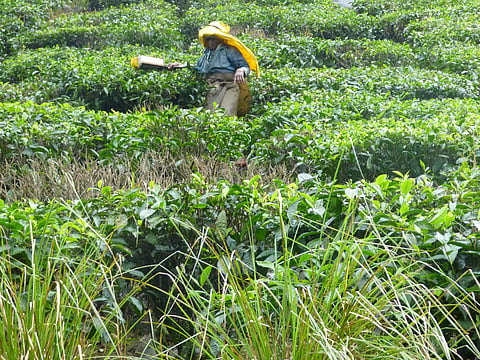

ALIPURDUAR: Tucked below the Bhutan hills in North Bengal's Dooars region, Alipurduar Lok Sabha constituency - one of the greenest places in West Bengal with its tea gardens, forests and rivers - will witness a battle mainly between two parties - the TMC and the BJP.
A reserved constituency for scheduled tribes, Alipurduar has a large percentage of Adivasis who migrated to the region during the British era to work in tea gardens and also has a sizeable chunk of Nepalis and Rajbangshi tribals.
The "poor condition" of tea garden workers is going to play a major role as the constituency goes to polls on April 11 in the first phase of the Lok Sabha elections.
Closure of several tea gardens since the 1990s has led to hardships for the workers and their families, forcing them to do other menial work for survival.
The ruling TMC, the BJP and the Left Front constituent RSP had fought neck-and-neck - each bagging over 3 lakh votes - in the 2014 general elections, but the support base of the Left party appeared to have dwindled since then.
Congress had come a distant fourth at that time.
Trinamool Congress (TMC) MP Dasrath Tirkey, who has been renominated by the party, claimed that out of a total 65 tea gardens in Alipurduar, 15 had earlier been closed.
Now, 13 of these are open and efforts are on to reopen the remaining two gardens, Tirkey said.
BJP candidate John Barla claimed that tea garden workers were being exploited by owners and contractors who force them to work for very low wages.
He said the workers are paid Rs 176 per day, though the minimum wage for a daily labourer is fixed by the government at Rs 350.
"In some gardens, workers are paid even Rs 132 per day and the workers are forced to accept it since they have no alternative," he claimed.
"The state labour department is not looking after the interests of the tea garden workers, a large number of whom are Adivasis," the BJP candidate said, adding that about 45 per cent of the constituency's population are Adivasis.
Suman Rai, a tea garden labourer at Kalchini, said the condition of the workers should change for the better and leaders should make their promises a reality.
"Since the Left Front, we have seen many leaders who gave us hopes of a better life. I only wish that our future generation gets a better deal," he said.
In this backdrop, claims and counter claims on workers' conditions are being made by the two major players in the elections - the TMC and the BJP.
While Prime Minister Narendra Modi has remarked in a recent public rally at Siliguri that West Bengal Chief Minister Mamata Banerjee is a "speed breaker" in the welfare of tea garden workers and others, the TMC supremo has said the BJP-led NDA government at the Centre has not done anything for them despite having made "tall promises.
" Banerjee said it is her government which has provided foodgrains at very nominal rates, free healthcare and education for the well-being of the tea garden workers.
A tea garden worker with no immovable assets as per his affidavit, Barla claims to have worked with the people of the region since 2007.
"I am a permanent worker at Lakhipara tea garden and I live in its quarters," he said.
Talking about his opponent and the sitting MP from TMC, Barla said, "He claims to be an adivasi, but has never done anything for the indigenous people."
"I have spent 45 days in jail for fighting for the legitimate rights of the adivasis here who have been deprived by the Trinamool Congress government," he told PTI.
Barla alleged that Tirkey has not once visited two closed tea gardens - one of which has been closed for six months and the other for two years.
Reacting to this, Tirkey said, "He must have developed cataract if he cannot see development in the area."
He said in the last five years, Chief Minister Mamata Banerjee has showered Alipurduar, which was made a district from being a sub-division within Jalpaiguri district in 2014, with several projects including an university, medical college and an engineering college.
Tirkey, however, admitted that connectivity in remote areas of the district, which is criss-crossed by several rivers, is an issue.
"Colleges and hospitals have come up, but getting there becomes a problem for us during monsoons. Overflowing rivers cut us off from the rest of the district. It is extremely difficult for us to get access to emergency medical aid and children cannot go to school," said Minati Oraon who lives in a small hamlet in Mahakalguri.
Five major rivers - Torsa, Kaljani, Raidak, Jayanti and Sankosh - apart from several smaller rivers and rivulets flow through Alipurduar.
Tirkey, a three-time RSP MLA from Kumargram assembly seat within Alipurduar Lok Sabha constituency, had joined the TMC and won in TMC ticket in the 2014 general elections.
With Leftist trade unions very strong among the tea garden workers, Alipurduar seat has been the citadel of Left Front constituent RSP from 1977 to 2014.
In the 2014 elections, TMC's Dasrath Tirkey won by 21,397 votes defeating Manohar Tirkey of the RSP, while the BJP came third.
While Dasarath Tirkey got 3,62,453 votes, RSP's Manohar Tirkey bagged 3,41,056 votes and BJP's B B Oraon polled 3,35,857 votes in 2014.
The Congress stood fourth polling 1,16,118 votes.
RSP candidate Mili Roy said she was confident of wresting the seat from the TMC.
"We take everybody together, we do not indulge in divisive politics as is being done by the others," she said.
Besides the TMC, the BJP, the RSP and the Congress, three other candidates - the SUCI and two Independents - are in the fray from the seat.